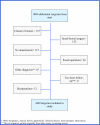Diagnosis, treatment, and consequences of anastomotic leakage in colorectal surgery
- PMID: 28070659
- PMCID: PMC5355508
- DOI: 10.1007/s00384-016-2744-x
Diagnosis, treatment, and consequences of anastomotic leakage in colorectal surgery
Abstract
Purpose: The aim of this study was to explore the choice of modality for diagnosis, treatments, and consequences of anastomotic leakage.
Methods: This is a retrospective study of consecutive patients who underwent surgery that included a colorectal anastomosis due to colorectal cancer, diverticulitis, inflammatory bowel disease (IBD), or benign polyps.
Results: A total of 600 patients were included during 2010-2012, and 60 (10%) had an anastomotic leakage. It took in mean 8.8 days (range 2-42) until the anastomotic leakage was diagnosed. A total of 44/60 of the patients with a leakage had a CT scan of the abdomen; 11 (25%) were initially negative for anastomotic leakage. Among all leakages, the anastomosis was taken down in 45 patients (76.3%). All patients with a grade B leakage (n = 6) were treated with antibiotics, and two also received transanal drainage. The overall complication rate was also significantly higher in those with leakage (93.3 vs. 28.5%, p < 0.001), and it was more common with more than three complications (70 vs. 1.5%, p < 0.001). There was a higher mortality in the leakage group.
Conclusion: This study demonstrated that one fourth of the CT scans that were executed were initially negative for leakage. Most patients with a grade C leakage will not have an intact anastomosis. An anastomotic leakage leads to significantly more severe postoperative complications, higher rate of reoperations, and higher mortality. An earlier relaparotomy instead of a CT scan and improved postoperative surveillance could possibly reduce the consequences of the anastomotic leakage.
Keywords: Anastomotic leakage; Colrectal surgery; Postoperative complications.
Conflict of interest statement
Conflict of interest
The authors declare that they have no conflict of interest.
Figures
References
MeSH terms
LinkOut - more resources
Full Text Sources
Other Literature Sources
Medical




